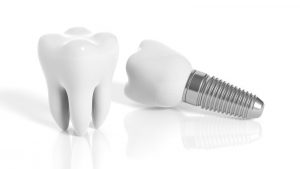
Zirconia dental implants, otherwise known as ceramic dental implants, are a recent advancement in oral surgery. As a natural alternative to traditional titanium, these implants are resistant to corrosion and won’t trigger metal allergies. These implants are known to be hypoallergenic and safe for patients with sensitivity or allergies.
A More Natural Look
Another advantage to Zirconia dental implants is they have a creamy white color — there is no risk of the dark color leaking through the gums as you have with titanium dental implants. Since these implants are ceramic, there’s no chance of heat conductivity or possibility of corrosion.
A Recent Advancement in Oral Surgery
The catch with Zirconia dental implants is they are relatively new. They were first used in Europe in 1987 and have only been used in the US since 2007. That said, we don’t know much about their long-term effects. Traditional dental implants are known to be a permanent solution to tooth replacement. While we expect similar results from ceramic dental implants, they haven’t been around long enough to know.
So far, however, success in terms of bone integration and longevity is about the same as with titanium. But patients who grind their teeth may experience difficulties because ceramic does not hold up to the constant force as well as titanium.
Limits to Zirconia Dental Implants
Zirconia dental implants do have their challenges. First, their abutment position is very critical. Titanium implants have more leeway when it comes to their positioning. Ceramic dental implants must also be one piece — this presents challenges in terms of the rigidity and stability of a cemented restoration. One-piece implants are less flexible than those with two parts secured by torqued screws.
Zirconia dental implants may not be the best for patients with bone density issues, especially those who may need a dental bone graft to accommodate the implant. That’s because Zirconia dental implants come in one piece, unlike titanium implants which can be two different pieces, which allows for greater customization of the implant. As single piece implants, ceramic tend to be more limited.
Zirconia dental implants also tend to be more expensive. Because of this, they are not always covered by dental insurance.
Are Zirconia Dental Implants Truly Metal Free?
Since Zirconia dental implants are offered as a metal free alternative to traditional implants for those who may be allergic to metal, many ask if zirconia is truly metal free. Zirconia is manufactured from zirconium dioxide, but during the manufacturing process an irreversible chemical reaction occurs where electrons move from the zirconium to the oxygen molecules. As a result, ceramic zirconia has completely different material properties compared to the metal zirconium, including wear resistance, toughness and conductivity. That’s why Zirconia implants are known to be “metal free” and a healthy alternative for those who may suffer from metal allergies.
